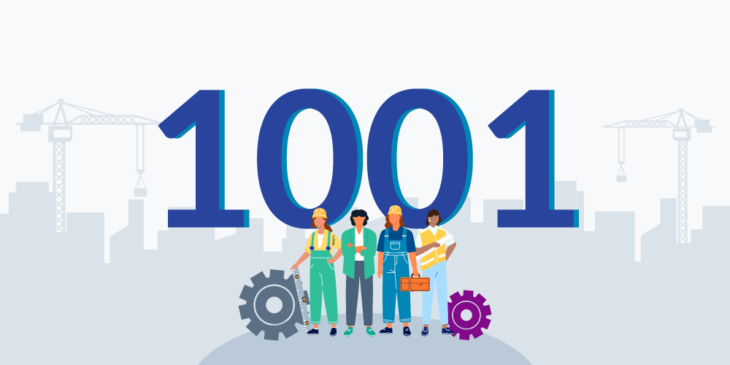
Shelly Runyan is President and CEO of Titus Electrical and Titus Systems, the largest independent electrical contracting company in Central Texas. I sat down with Shelly to talk about her ongoing experience as a woman in a major construction leadership role.
Shelly, an industry veteran of 35 years, describes her surprising breakthrough into construction, the importance of having a great team on your side, and what advice she has for other women looking to make their mark in the construction industry.
Breaking into the industry
Lori: You do a lot of stuff! What got you into construction?
Shelly: It wasn’t a plan. I was in college getting a degree in international business management. I started dating a guy who was an electrician. We ended up living together. He had a job he could do. I had an American Express card and we ended up doing a job.

See what 1,001 women in construction said about their jobs, their coworkers, and the state of the industry.
And then we ended up doing more jobs. And the next thing you know, I’m dropping out of college because my pager’s going off — this is back in the old days. And we’re working full time and things progressed fairly naturally.
You know, there were struggles and stuff, but I ended up doing that. So he became my husband. He then became my ex-husband and ex-business partner down the line. So I’ve had the company to myself since 2012. I bought him out. I realized how much I love the business and he had other things he was interested in. So it worked out well for both of us.
Have you found any differences with the company being woman-owned now, instead of being in a partnership?
I was always heavily involved in the company, so it’s just a change of who owns it now. But what’s funny is, you know, since we had done it so long together, a lot of people don’t realize he has gone, because I’m not one of these, “Hey, look at me, I’m out here [types].” I’m back in the back, getting the work done.
Have you taken any construction classes for this business outside of your international college that you were doing?
No. It’s just been an education by fire.
I think that’s the best way!
Yes! That doesn’t mean I don’t read up on things — you know, seminars — especially with COVID and figuring out all the different new rules or what’s expected, things like that. I’ve always done math, but I haven’t gone to school for construction management or anything.
“I’m back in the back, getting the work done.“
How have you all been doing with the COVID?
We’re doing all right. We’ve been fortunate that our folks who have gotten sick have all recovered, so that’s been really good. We’re just doing like everybody else, and figuring this out, and seeing how things change and what needs to be done. How do we need to be safe? How do we need to be flexible?
At the beginning of this, one of our guys called me, working on a Saturday, and he’s going, “Somebody came to the job site with a fever. What was he thinking?”
And I’m going “He was thinking it was last week, when you used to say ‘Man up and get out here,’ cause you told me you would be here. It’s just a cold. You’ll be fine.’”
So our whole attitude has changed. And it’s now it’s like somebody sneezes, they’re going “It’s allergies, I promise!” Or they’ll say “You know what? I know it’s allergies, but we’re in this meeting and I’m going to stay away over here.”

“We’re all together in this”
Read the interview with Anne Pfleger, CIT, President of the National Association of Women in Construction (NAWIC).
It’s all about being considerate of everybody’s comfort levels, of what you can and can’t do. And also making sure that you’re not being inconsiderate of others and putting them at risk because you don’t know their medical history. You don’t know their family situation.
And it’s hard to tell guys, “I’m sorry, you can’t come in. You’ve got to quarantine,” because of this. And they’re going “I’m fine; I’ve tested negative.” And I’m going “Yeah, but your mother, brother, and sister have it, the chances of you having it or being — you know — giving it to somebody are still there.”
So, do you have any advice that you would give any women that just want to start out, or any girls that are in college now that are trying to find a career?
Find your passion. Figure out what you want to do, and fight like hell for it. If you want to do something, be good at it. Because you’re going to have to do that in any career, any industry. And look at the different options — and don’t take no for an answer.
You’ve got the opportunities out there, and these days it’s much easier, I believe. And I’m not out there on the job market, but I know the people I talk to, they don’t think twice about female electricians, or female project managers, but you have to work hard and you have to be good at what you do.
“The fabulous thing about [sending notices] is everybody’s doing it now.“
And there are so many different aspects of construction now! It’s not, “you either have your tools on or you’re in the office.” You have safety, you have HR, you have computer modeling, you have BIM. You have project admin, you have project management, you have purchasing, you have logistics.
There are so many parts to it that most people don’t think of. The women that end up in this, in the old days, they just sort of found it through some kind of admin, but now there are courses out there. You know, Texas State University has a great construction management program.
How do you think the construction industry might change over the next 10 years? I mean, I know we have COVID now, and you don’t really know when that’ll end, but any other thoughts or projections?
Automation is becoming huge. The amount of data that is used from BIM, where you’re looking at conflicts with other contractors and laying everything out. The technology, the information that is sent from the field to the office, the daily updates — it’s just going to continue.
Now you’ve got robots in some parts that are doing things, but you’ve got to think about it though. You’ve got your plans on the computer. You’re doing coordination studies. You’ve got it all laid out. Why wouldn’t you have a computer or a robot doing some of these things?
But also what’s really come along is prefabrication. We used to do little bits and pieces in-house. Now, when we did Seton Medical Center at UT, JE Dunn had all the patients’ rooms prefabricated. You had your plumbing, your electrical, your framing — all of it’s done, and you’re coming in and you’re inserting these boxes into a building.
I hadn’t heard of that!
Yeah, it’s fascinating what they’re doing and how it’s coming along. And I’ve read about hotels — the same thing with the guest rooms. They’re all put together and just sort of inserted into the box.
Wow, that’s interesting. But that’s a new one for me. So it saves a lot of time, and probably causes difficulties and confusion, if you have everything prefab and get to put it where it belongs.
It does, and it also allows the job site to have less trade-stacking, because you’ve got people off site doing things, you’re going from component to component, and you don’t have this building that you can do all the all the guts and bits and pieces to it, and then just insert the other parts. So it makes it a much more efficient building system as well.
Do you find any particular area of the job more difficult than others?
Contract negotiation is always an issue. That’s how getting paid starts — going through the contract, reading every single line of it. And then going back and saying, “I hate to do this, what we’re going to have to change this,” because everybody says “You can’t change the contract.” This is how it always is.

Thea Dudley teaches credit & collections
Join the free certificate course to learn the foundations of credit & collections in construction with 30-year industry veteran Thea Dudley.
I always change [the contract]. Because there’s that paragraph at the bottom that says this has been mutually negotiated and is the benefit of one party or the other. You can’t sign that if you can’t negotiate.
But it doesn’t have to be a battle. It’s asking, explaining to the contractors what you’re trying to accomplish. “This paragraph says this; here’s my issue with it.” [Asking] “Do you have words? If you don’t like mine, then we can work on it.”
So it has a true negotiation going back and forth, and it can be frustrating on both parts, but at least at the end of the day, we all know what’s in that contract. And the thing is, is you don’t need the contract until you need it.
You hope you don’t have to go back and look at that. And most contractors are good. It’s those bad ones that over the decades you’ve had — those are the classes I’ve taken. Because of the bad contract negotiations.
This is a partnership with a contractor. We’re going to build something fabulous. And you want to work from day one together to that goal where it’s profitable for everybody, the customer gets an amazing end piece, and we all walk away and go “Good job!” That’s all you want. But you’ve got to lay the foundation along the way.
So starting with a good contract and then doing what you’re supposed to, following the lien laws, making sure and understanding that those are a tool, you know. It’s not necessarily a stick. It’s just what we have to do.
Mechanics Lien Rules & Requirements: Everything You Need to Know
And the fabulous thing about that is everybody’s doing it now. It used to be, “Oh, you can’t, don’t send a notice. They’re not going to get paid, or you’re going to start a fight.”
Now with everybody along the chain doing it, it actually helps. It helps the subcontractor and the supply houses, it actually helps the contractor in a lot of ways with the owner. “Hey, I’m sorry, I don’t have any control of this. This is Texas law. This is what we’re doing.” And they’re out there, they’re wanting to get paid, saying “Can you pay me please so I can pay them?”
So it’s a tool that I think helps everybody along the way. And plus, we’re following the law. It’s something that once you start doing it and you learn to explain it, and sometimes it takes two or three different times. And sometimes it’s actually copying and pasting the link to Levelset and going “Here, we’re not the only ones doing this.”
So I’ve actually done that, using Levelset to say “This is it.” Especially if you’re dealing with out-of-state contractors who don’t know. You know, this is Texas law. So you’re negotiating a contract and going “I can’t be held by New Jersey construction laws, because I don’t know them. And we’re doing work here in Texas.”
So in your position, what does your day look like?
My day is sort of interesting. I actually went and asked my vice president to tell me what I do. Because I do a little bit of everything. And he’s going, “Yeah, you’re involved in all the different aspects.”
He said, “When I’m explaining to somebody what you do, I look at you as a pilot. You’re keeping things in line. But you’re heavily involved; you’re touching everything without getting in our way.”
Because I’m involved in the accounting department, and the HR department, and pre-construction, deciding on what jobs we’re going to do. On the project management team, I’m in those meetings. But I look at my job as a support system, not a roadblock.
“We spend more time at work than we do at home. And if work is pretty good, life is really good.“
So being involved in those things, I can do a couple of things. One, I’m there to help guide what we’re doing, but also I’m there to help problem-solve. And if I’m not right in the middle of it — like your project managers, or your estimators, or accountant — I’ve got a different perspective. And since I’m involved with the other departments as well, I can help keep some things from flashing.
I like being involved in knowing what’s going on. I’m not really good at reports. I’d rather just sit back and listen and see what’s going on, and how I can help. Because at the end of the day, my job is to help everybody that works with me.
Because if I can make their job better, then life is better. We spend more time at work than we do at home. And if work is pretty good, life is really good.
The importance of teamwork
Is there a person or group that’s been a big inspiration or support in your career?
I have amazing people I work with. They have been so supportive through the transition and with the normal management. I’ve got teams in accounting and in construction and reconstruction and estimating from purchasing. All of my people are amazing, and the folks in the field — I couldn’t do any of what I do without them and without their support, and without their guidance and feedback. I count on them to be honest with me and tell me, “Hey, this is going on,” or “We’ve got this problem.”
We’re very collaborative. We like to problem-solve together, because between all of us, we see things a little differently. We have a better understanding, some of us, of the beginning process versus the end, versus those who are in the middle of it, and what we’re missing. So we’re always asking for feedback.
In a lot of businesses, their employees are numbers. So to actually appreciate what they’re doing, trusting what they’re doing — I’m sure they really appreciate that.
I really appreciate them and the value that they bring. They are amazing, and they’ve got so much talent that I couldn’t do what I do without them. And when you surround yourself with fabulous people, when you let them do their job, that you can give them support, you don’t hang them out there.
A bright future for construction payments
Shelly highlights the importance of sending notices and keeping up with the lien laws in Texas, where Titus Electrical Systems does all its business. She’s seen the change happen throughout the industry — where sending notices was once seen as a taboo, to them being a commonplace tool that benefits everyone involved in a project’s payment chain.
Keeping track of lien and notice laws and deadlines helps Shelly make the complex system of construction payments a little easier — for her team and all the contractors she works with.